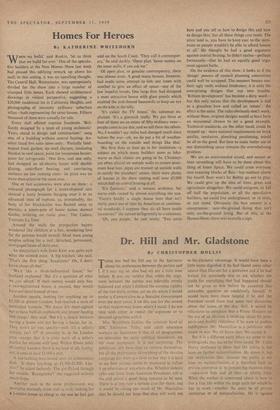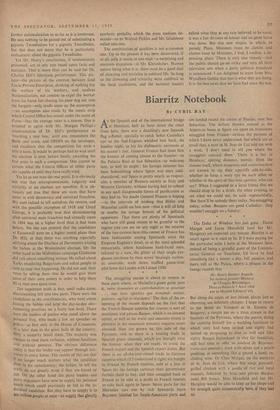Dr. Hill and Mr. Gladstone
By CHRISTOPHER HOLLIS
rr APER has had his full say in the Spectator I about his preferences between the parties and I, if I may say so, also had my say a little time before. It was my verdict that, while the argu- ment between the parties was tolerably evenly balanced and while I disliked the extreme rigidity of the two-party system, yet on the whole I would prefer a Conservative to a Socialist Government over the next years. 1 set this out for the record so that readers may know where I stand. I do not here wish either to repeat the argument or to demand agreement with it.
Mrs. Wyndham Goldie, the assistant head of BBC Television Talks, told adult education workers on September 6 that of all programmes on television the party political broadcasts arc the most unpopular. It is not surprising. The politicians still have time to retrieve themselves, but all the preliminary skirmishing of the election campaign has been at a level so low that it is hard to .see how anyone could be interested to follow it on television or anywhere else. Whether summit talks and visits from American Presidents will in the end prove a good thing remains to be seen. There is at any rate a serious case for them, and it would be asking too much of Mr. Macmillan that he should not hope that they will work out
to his electoral advantage. It would have been a little more dignified if he had found some other source than Disraeli for a quotation and if he had waited for somebody else to ask whether the credit for everything that had happened should not be given to him before he answered this debatable question so confidently himself. It would have been more helpful if he and the President could have had some real discussion about the issues of the day. Still, it would be ridiculous to complain that a Prime Minister on the eve of an election is thinking about his pros- pects and doubly ridiculous if he were to profess indifference. Mr. Macmillan is a politician who wants to win. We all know that. We accept it.
But it is a different story when we come to the propaganda that has so far been issued. Mr. Colin Hurry professes to show that the public is not keen on further nationalisation. He shows it, but the implication that, because the public is not keen on nationalisation, it is therefore keen on private enterprise in its present big-business form —take-over bids and all that--is wholly false. What the worker is concerned about is how to live a free life within the large units for which he has to work--whether the units be of private enterprise or of nationalisation. He is against
further nationalisation in so far as it is irrelevant. He sees nothing to be gained out of substituting a gigantic Tweedledum for a gigantic Tweedledee, but that does not mean that he is particularly enthusiastic about the gigantic Tweedledee.
Yet Mr. Hurry's conclusions, if tendentiously presented, are at any rate based upon facts and statistics. That is more than can be said for Dr. Charles Hill's television performance. This pic- ture—the picture of the contrast between kind Uncle Private Enterprise, thinking of nothing but the welfare of his workers, and soulless Nationalisation, not content to expel the worker from his home but chasing his poor dog out into the bargain--only made sense on the assumption —an assumption also made by the comic strip which Central Office has issued under the name of, Form—that the average voter is a moron. One is tempted to agree with Mr. Morgan Phillips's condemnation of Dr. Hill's performance as 'reaching a new low,' until one remembers the Bank rate scare, and OHMS on the envelopes, and recollects that the competition for such a title is keen. It would be perhaps best to wait until the election is .over before finally awarding the first prize in such a competition. One cannot be certain what the Central Offices of either party are capable of until they have really tried.
Yet let us not miss the real point. It is obviously not true that misrepresentation, vulgarity and triviality at an election are novelties. It is ob- viously not true that these are vices that have come in with democracy and universal franchise. We used indeed to tell ourselves the reverse, and with the possible exception of 1918 and Lloyd George, it is probably true that electioneering after universal male franchise had virtually come in 1884 was on a higher level than it had been before. No one can pretend that the candidates at Eatanswill were on a higher moral plane than Dr. Hill, or that there was anything especially edifying about the Duchess of Devonshire kissing the babies at the Westminster election. On the other hand in the Midlothian campaign Gladstone did talk about something serious. He talked about Turks murdering Bulgarians and asked people to vote to stop that happening. He did not seek their votes. by telling them that he would give them some of their own money in order to help them fill in their own spare time.
The important truth is that, until radio came, electioneering fell into two parts. There were the candidates in the constituencies, who went about kissing the babies and kept the day-to-day elec- tioneering practices on a fairly low level. There were the leaders of parties who stood above the personal fray, who made a few set speeches on Policy--at first only in the House of Commons, at a later date in the great halls of the country. Only a minority heard them. The majority was content to read them verbatim, without headlines and without pictures. The obvious difference today is that the leader can appear through tele- vision in every home. The results of this are that it no longer much matters what the candidate noes in his constituency; the babies, to tell the truth, do not greatly mind if they are kissed or .not. On the other hand the party leaders and party organisers have now to supply the personal touch which could previously be left to the in- dividual candidate. But they have to supply it to ten million people at once—to supply that ghastly synthetic geniality which the mass medium de- mands—to be Wilfred Pickles and Mr. Gladstone rolled into one.
The combination of qualities is not a common one. Up to the present it has been discovered, if at all, only it seems in one man—a surprising and ominous exception—in Mr. Khrushchev. Human nature being what it is, there must be a good deal of clowning and triviality in political life. So long as the clowning and triviality were confined to the local candidates, and the national leaders talked what they at any rate believed to be sznse, it was a fair division of labour and no great harm was done. But this new utopia, in which, to parody Plato, Ministers must be clowns and clowns must be Ministers, I find, I confess, a de- pressing place. There is only one remedy—that the public should go on strike and turn off their television sets when a party political broadcast is announced. 1 am delighted to learn from Mrs. Wyndham Goldie that that is what they are doing. It is the best news that we have had since the war.



































 Previous page
Previous page